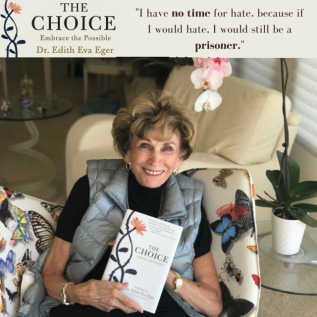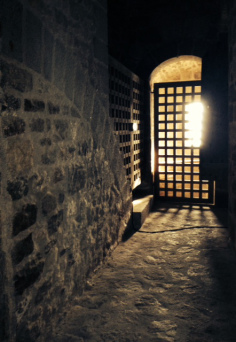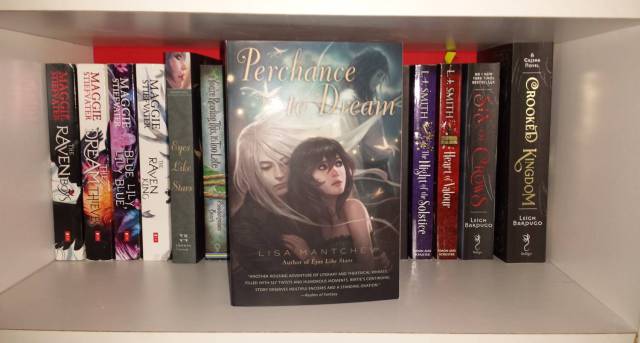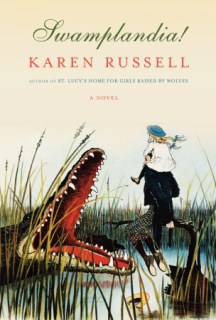
Edith Eva Eger was starved, beaten and terrorized on a daily basis during her brutal stay at a WWII Nazi death camp, even forced to dance with Josef Mengele, the infamous Angel of Death who murdered her parents along with countless others. She survived that horrible time by clinging to her mother’s last words before being sent to the gas chamber, “I want you to remember, no one can change what is in your own mind”.
That brief sentence became a personal mantra for Eger, both during her time at Auschwitz and while battling the post-traumatic stress disorder she suffered for years after the war. In fact she built an entire career around it, as a highly successful clinical psychologist, helping thousands overcome trauma by accessing what’s inside of them to make the shift from victimhood to empowerment.
This took time though, as survivor’s guilt messed with her thinking process, causing much shame. Years after refusing to walk at her graduation from the University of Texas (with honors) because she felt too old, she realized she never really left the concentration camp. As she says:
“I became a high achiever because I never thought I deserved to survive. So where is Hitler? I didn’t need the Nazi. I had one in me.”
Fortunately, most of us will never experience what Dr. Eger did during the Holocaust, but we all carry trauma from the past that bleeds in to the present. Our own inner Nazi exploits this with words like:
“You’ll never make this work.”
“How could you be so stupid?
“You’re a fraud.”
“Nobody really likes you.”
“You’re ugly.”
“You don’t measure up.”
“What’s wrong with you?”
“Why did you say something so dumb?”
Crippling self talk poisons a person’s soul and can rob them of their ability to be who God created them to be. It stems from anger and resentment and breeds a victimhood identity, which in turn brings on depression, fear and spiritual paralysis.
If anyone has the right to be angry and resentful of their past, it’s Dr. Evers, yet she is not. When asked about going back to Auschwitz 35 years after the war ended she said,
“Oh, it was the most excellent thing I’ve ever done. I needed to look at that large lion in the face and I needed to laugh at him.”
Dr. Evers believes our thought process plays a critical role in how we cope with life and that it’s essential for those stuck in the past to face their own lions and to not let others or events define who they are. She goes on to say:
“I do have a story but I am not my story. I may not have overcome it but I came to terms with it. It is wonderful to be a WHOLE person – the more you depend on needing others to heal… the more you are a victim.”
Avoiding pain is a national pastime in America. Sky rocketing substance abuse levels, intolerance of views we disagree with, trigger warnings on even remotely controversial content; this all feeds in to a collective desire to hide from discomfort. It’s these very protections though, these giant “safe spaces” we draw around our lives, that can prevent inner reflection and emotional growth.
Yet our societal instinct is to numb emotions through antidepressants, drugs and alcohol, which only feeds a vicious cycle that leads back to victimhood.
Does this mean we should be happy when difficult times come around? Of course not, but we should recognize the value these experiences bring in teaching us how to deal with life and each other.
On May 4th, 1945, seventeen-year-old Edith Eger was left to die in a pile of corpses and would surely have done so had an American soldier passing by not glanced up and seen her hand move. Emaciated, barely breathing with a broken back and suffering from Typhus, it was a miracle she survived.
Dr. Eger believes she was allowed to live through those awful days of the Holocaust for a reason. It was God she turned to then for the strength, “to turn hatred into pity” and “to pray for the guards” and who put her on a mission to lead others out of their emotional imprisonment to what she calls the ultimate spiritual freedom of forgiveness and love.
“I remember, God had spoken to me, and said, if you die, you’re going to be a coward. But if you live, I’m going to show you that you’re going to be for something.
And how does she feel now after all those years?
“We are all survivors here and not a victim. I don’t have time to be a victim. I was victimized.”
And about Hitler?
“I am a mother of 3, grandmother of 5 and great grandmother to 3…, that is the best revenge against Hitler.”
Amen to that Dr. Eger and God bless you.
To learn more about this remarkable woman and her new book, The Choice, go here.
 “The biggest concentration camp is in your own mind and you can find the key in your pocket.”~Edith Eva Eger
“The biggest concentration camp is in your own mind and you can find the key in your pocket.”~Edith Eva Eger
Share this:





